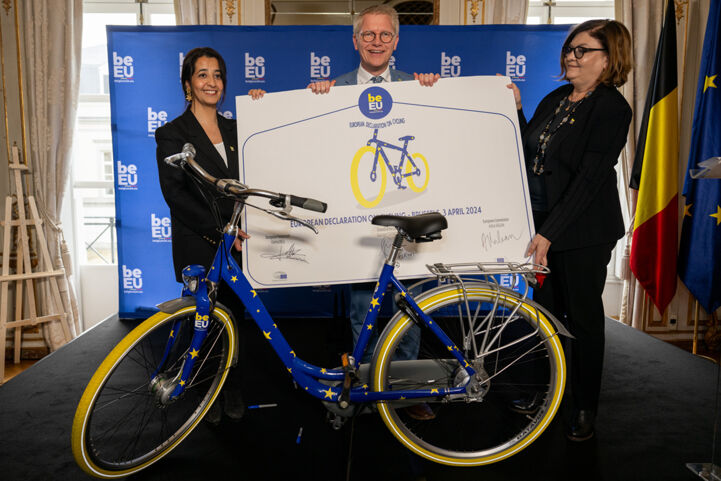European Declaration on Cycling: What impact for cycling tourism and cycle route networks?
On 3 April 2024, the European Council, Commission and Parliament signed the European Declaration on Cycling, finalising a process initiated in 2022 and officially adopting the first inter-institutional cycling policy at the European level. It is the most ambitious EU initiative on cycling to date. With eight core principles and 36 commitments, this landmark declaration described cycling as one of the “most sustainable, accessible and inclusive, low-cost and healthy forms of transport and recreation, and its key importance for European society and economy.” The European Cyclists' Federation (ECF) celebrates this historic milestone for cycling in Europe.

The Declaration recognises cycling as a fully-fledged mode of transport but also refers to its recreative dimension. Cycling tourism is included in chapter VI, together with multimodality. Long-distance cycle routes are connected to commitments on sustainable mobility planning (chapter I) and creating a coherent cycling network in cities and improving connectivity between suburban and rural areas and city centres (chapter III). For a more detailed analysis on cycling tourism in the Declaration, refer to our article of 13 November 2023.
The Declaration, a non-binding one, sets out a roadmap on cycling as a sustainable and inclusive mode of transport and recreation for all European citizens. Its implementation will be further discussed within the institutions in the next months. ECF stands ready to fully support its effective implementation, including its impact on cycling tourism and cycle routes.

ECF calls MEP candidates to commit to supporting cycling in the upcoming political term with the Shift Gears for Europe manifesto for the 2024 European Parliament elections on 6-9 June. The adoption of the European Declaration on Cycling presents MEPs with a unique opportunity to ensure that cycling is a top EU political priority. The manifesto includes six specific action points that MEPs can undertake to ensure citizens can directly benefit from cycling, and one of them is specifically about EuroVelo.
The European Declaration on Cycling stresses the role of Member States, together with regional and local authorities, to support the further growth of cycling. Cycling tourism and cycle routes schemes should be part of those strategies. In its latest report on National Cycling Strategies in Europe (2023), ECF identifies 12 countries including EuroVelo in their strategy, along with references to National cycle route networks (10) and cycling tourism (12), out of 21 countries having a specific or similar national cycling strategy. While this is a clear recognition of the relevance of EuroVelo, cycling tourism and cycle routes, ECF advocates for even more countries to define ambitious policies on these topics.
Cycling is receiving more and more political attention. Let’s use this opportunity and change statements into actions and results for the benefit of all European citizens!
Article by Agathe Daudibon